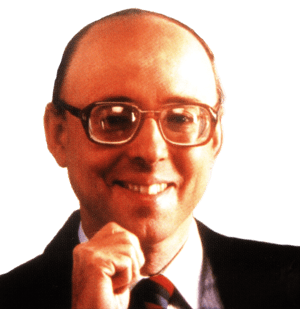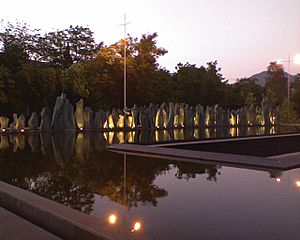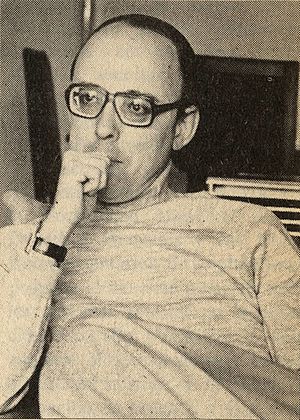Jaime Guzmán facts for kids
Quick facts for kids
Jaime Guzmán
|
|
|---|---|
 |
|
| Senator for Santiago Poniente | |
| In office 11 March 1990 – 1 April 1991 |
|
| Succeeded by | Miguel Otero Lathrop |
| Personal details | |
| Born | 28 June 1946 Santiago, Chile |
| Died | 1 April 1991 (aged 44) Hospital Militar de Santiago, La Reina, Chile |
| Political party | Independent Democratic Union |
| Alma mater | Pontifical Catholic University of Chile |
| Profession | Lawyer |
| School of thought |
|
| Era | 20th-century philosophy |
| Region | South American philosophy |
| Influences | |
| Influenced |
|
Jaime Jorge Guzmán Errázuriz (born June 28, 1946 – died April 1, 1991) was an important Chilean lawyer and politician. He was a professor who taught about the country's laws and helped write speeches. He also helped start the conservative political party called the Independent Democratic Union. In the 1960s, he was a leader in the Gremialist movement, which was a student group.
Jaime Guzmán was against President Salvador Allende. Later, he became a close advisor to Augusto Pinochet during his military rule. He played a big part in creating the Chilean Constitution of 1980, which is Chile's main set of laws. He served as a senator for a short time when Chile was becoming a democracy again. Sadly, he was killed in 1991 by members of a group called the Manuel Rodríguez Patriotic Front.
Contents
Early Life and Education
Jaime Guzmán was born in Santiago, Chile. His father, Jorge Guzmán Reyes, was involved in sports at the Catholic University. His mother, Carmen Errázuriz Edwards, was a travel agent. From 1951 to 1962, he went to the Colegio de los Sagrados Corazones de Santiago. Even when he was young, he loved reading and showed strong leadership skills. He became interested in politics during his last year of high school and graduated at just 15 years old.
In 1963, at 16, he started studying law at the Pontifical Catholic University of Chile. He finished his degree in 1968 with the highest honors. He even won an award for being the best student in his class.
During his time at university, he started a conservative student group called the Movimiento Gremial Universitario. This group became very popular and won control of the student union at the Catholic University in 1968. This group quickly grew and spread to other major universities in Chile.
Role After the 1973 Military Coup
After the military coup in 1973, Jaime Guzmán became a close advisor to General Augusto Pinochet. He was a very important person in shaping policies in Chile during this time. Just two days after the coup, Guzmán was asked to help create a new constitution. He later joined a group called the Comisión Ortúzar, which was in charge of writing this new constitution. He also helped write some of Pinochet's important speeches, like the Chacarillas speech of 1977.
Guzmán became interested in neoliberal economic ideas, which were supported by a group called the Chicago Boys. He worked closely with Pinochet and his minister, Sergio Fernández.
Even though Guzmán never held an official job in Pinochet's military government, he was one of his closest helpers. He played a key role in developing the government's ideas and often gave political advice. He said he had a "negative opinion" of Manuel Contreras, who was the head of the National Intelligence Directorate. This caused him some problems.
During Chile's Return to Democracy
When Chile began its return to democracy, Jaime Guzmán ran for election. Even though he came in third place, he was still elected as a senator. This was because of Chile's special binomial electoral system.
Until his death, Guzmán continued to teach constitutional law at the Catholic University of Chile. He was known for his deep knowledge of the law.
Death

Jaime Guzmán was killed on April 1, 1991. He was shot as he was leaving the Catholic University, where he taught. He was taken to a hospital nearby but died three hours later from his injuries.
His assassination was carried out by members of a far-left group called the Frente Patriotico Manuel Rodriguez (FPMR). The people who shot him were Ricardo Palma Salamanca and Raúl Escobar Poblete. However, the leaders of the movement, Galvarino Apablaza, Mauricio Hernández Norambuena, and Juan Gutiérrez Fischmann, are believed to have planned the murder since the 1980s.
Mauricio Hernández (also known as "Commander Ramiro") was the only one arrested and tried for Guzmán's murder. But after being in a Chilean prison for less than three years, he escaped and went to Cuba. In 2002, Hernández was arrested in Brazil for kidnapping a businessman. He is now serving his sentence in Chile.
Guzmán's death led the government of President Patricio Aylwin to create a new intelligence group called La Oficina on April 26, 1991. This group's job was to stop violent left-wing groups that had not accepted Chile's return to democracy.
Political Ideas
When Jaime Guzmán was only 12 years old, he helped with the political campaign of Jorge Alessandri. Guzmán said he felt "a close connection" to Jorge Alessandri and that Alessandri "influenced me most in my interest for politics." He admired Alessandri greatly.
Guzmán was also influenced by his teacher Jaime Eyzaguirre and by Plinio Corrêa de Oliveira.
Around the time of the 1973 military coup, Guzmán learned about the ideas of Milton Friedman and the Chicago School of Economics. He learned these ideas through his connections with people like Miguel Kast, who were part of the Chicago Boys.
According to historian Renato Cristi, when Guzmán helped write the Chilean Constitution of 1980, he used ideas from Carl Schmitt, a German thinker, and from Friedrich Hayek's ideas about a market society. This helped create a framework for a strong government with a free market economic system. When Hayek's ideas didn't fully fit what Guzmán wanted, he found inspiration in a book called The Spirit of Democratic Capitalism by Michael Novak.
See also
 In Spanish: Jaime Guzmán para niños
In Spanish: Jaime Guzmán para niños
 | James Van Der Zee |
 | Alma Thomas |
 | Ellis Wilson |
 | Margaret Taylor-Burroughs |


